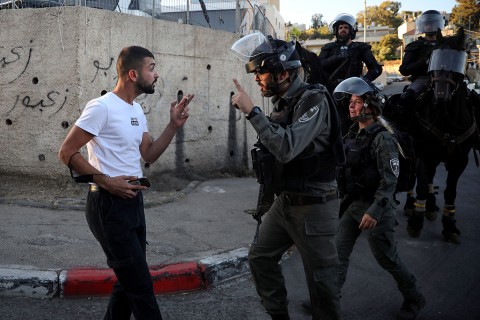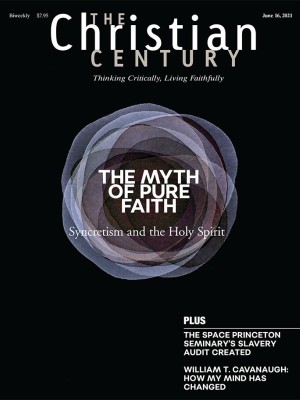Is there any hope for a just peace in Israel and Palestine?
A two-state solution seems as far off as ever. It’s also the only viable way forward.

The conflict between Israel and Palestine hasn’t appeared on this magazine’s editorial page in a long time. While this is not by design, nor is it exactly by accident. Our editorials aim to reflect the consensus view of the Century editors, and there has long been little consensus among us on how to talk about this conflict. The same is true of the larger Christian community we serve and are part of. Few issues are more fraught, few conversations more likely to veer quickly into knee-jerk reactions, oversimplified narratives, defensive postures, accusations of hatred, or paralyzing despair.
When US Christians talk about Israel and Palestine, we should do so with care, recognize that we’re guests in someone else’s conversation, and resist easy answers. What we say—or fail to say—may put people’s lives in danger, both in the Holy Land and in the United States. After the latest round of fighting, which killed more than 240 Palestinians and 12 Israelis—and sparked a spate of attacks on diaspora Jews—here is what we believe it is responsible and necessary to say.
Read our latest issue or browse back issues.
Both Palestinians and Israelis have suffered intense trauma. It is written into their history and their bodies, handed down from generation to generation, and deepened by the fear that continues to overshadow their daily lives.
Israel has the right to exist in the Holy Land as a Jewish state, yet its citizens feel threatened from all sides. Palestinians have the right to exist in the Holy Land as well, yet they are a stateless people who have been consistently deprived of adequate housing, food, water, health care, jobs, infrastructure, and administration of their holy sites.
The only viable way forward is a two-state solution, despite the many limitations of that model. It is the only path that prioritizes both a Jewish-majority Israel and the basic rights of democracy for Palestinians. A democratic single state would no longer be Jewish; a Jewish-ruled single state would not be democratic (see “A land divided,” Jan. 9, 2013). The status quo looks a lot like the latter scenario, and this is neither politically sustainable nor morally acceptable.
But the possibility of a two-state solution is being hampered by leaders on all sides. Fatah, which governs Palestinians on the West Bank, has failed to lead democratically and has been unwilling to cede power to new leadership. In Gaza, Hamas uses Palestinian suffering and death to attract international aid to build the infrastructure for war against Israel. The Israeli government has far more power in this situation than any Palestinian entity, and Prime Minister Benjamin Netanyahu claims to favor a two-state solution. But again and again his government sabotages this ostensible goal by supporting land grabs on the West Bank and other human rights violations in the Palestinian territories.
A two-state solution seems far away. So does the possibility of a lasting peace that promises security and protects human rights, under whatever arrangement. Still, we hope for a just peace—because all people in the Holy Land deserve to flourish.
A version of this article appears in the print edition under the title “No easy answer.”





